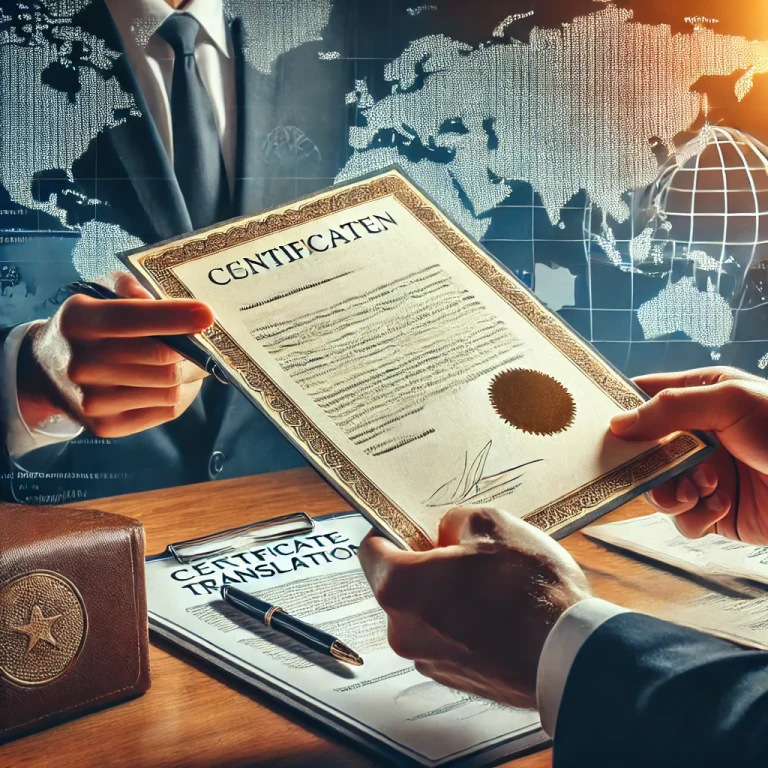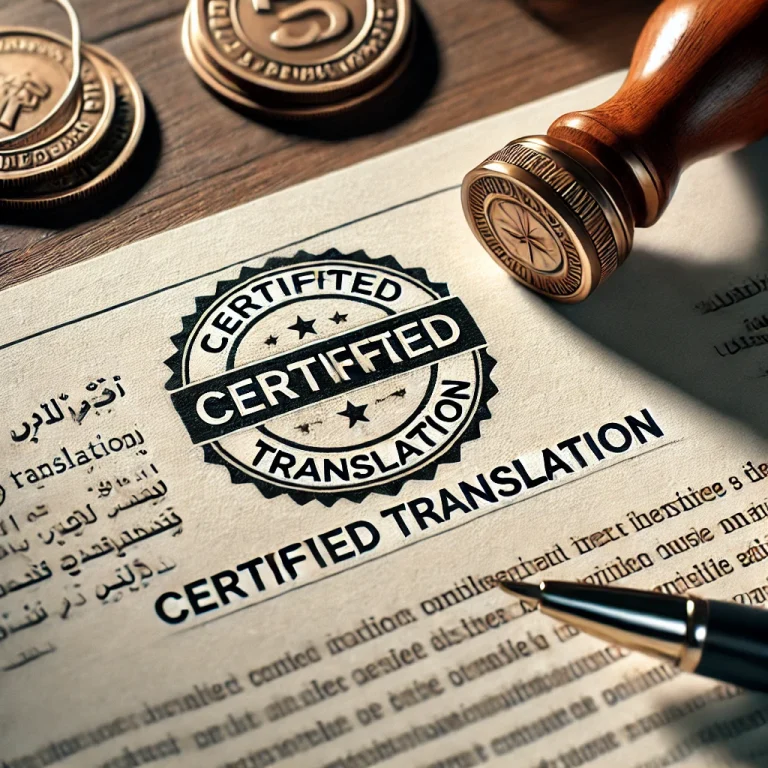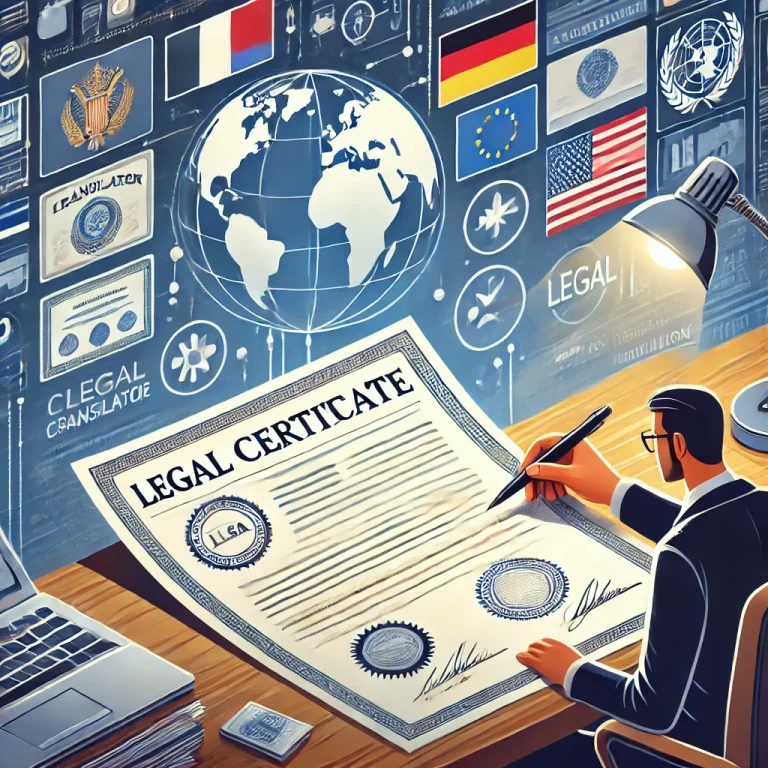In an increasingly globalized world, the need for accurate certificate translation services has never been more essential. Whether you’re dealing with international legal matters, immigration, or educational pursuits, understanding the value of translating certificates accurately can ensure smooth cross-border communication and compliance with legal requirements. This article explores why certificate translation is important and how you can benefit from professional document translation services.
What Is Certificate Translation?
Certificate translation involves the accurate translation of official documents such as birth, marriage, and academic certificates from one language to another. These documents often carry significant legal weight, and any errors or omissions can lead to delays, legal complications, or even rejections from authorities.
Why Certificate Translation Is Important?
Global Transactions
As the world becomes more interconnected, people frequently need to use official documents in foreign countries. For instance, if you’re planning to move abroad for work, study, or marriage, having your certificates accurately translated becomes crucial.
Legal Requirements
Governments, educational institutions, and employers often demand translated certificates to be certified and validated. A misinterpreted term or mistranslation could result in legal disputes or the invalidation of your certificate.

Common Types of Certificates Requiring Translation
Birth Certificates
Birth certificates are frequently requested for visa applications, citizenship processes, and school enrollments in foreign countries. Translating these documents accurately is key to avoiding legal obstacles.
Marriage Certificates
If you plan to get married abroad or apply for citizenship, a certified translation of your marriage certificate may be required by the foreign country’s legal system.
Academic Certificates
When applying to universities or jobs abroad, translated academic certificates are often necessary to prove your qualifications.
Death Certificates
In cases of inheritance or property disputes in another country, a properly translated death certificate can provide crucial evidence.
The Role of Certified Translation in Document Accuracy
Certified vs. Non-Certified Translation
Certified translation ensures that the translated document is an accurate representation of the original. This distinction is critical for official matters, such as legal proceedings or immigration processes. Non-certified translations may not hold up in legal contexts, leading to potential complications.
The Importance of Accuracy in Legal Documents
Legal documents must be precise and error-free. Even minor mistakes can lead to a document being rejected or delayed, costing you time and money. By using a certified translator, you guarantee the accuracy and legal standing of your translated document.

Certificate Translation and Validation
The Process of Certificate Validation
Certificate validation involves confirming the authenticity of both the original document and its translation. Without proper validation, your document might not be accepted by foreign authorities.
Legal Implications of Incorrect Translation
Incorrectly translated documents can have serious consequences, including visa denials, legal sanctions, or delays in your plans. Partnering with a certified translation provider minimizes these risks.
How to Choose Reliable Certificate Translation Services?
Experience and Expertise of the Translator
When choosing a translation service, look for translators with expertise in the specific type of document you need to be translated. Not all translators are proficient in legal or technical jargon, which is essential for accurate translation of certificates.
Certification and Accreditation
A reliable document translation service should offer certified translations. It’s important to ensure that the translator is accredited by a recognized body, such as the American Translators Association (ATA), as this adds credibility to the translation.
Certified Translation and Legal Considerations
Notarization and Apostille
Some documents may require additional validation through notarization or an Apostille. This process confirms that the translated document is legally recognized by foreign authorities.
Legal Use in Foreign Countries
Foreign governments often have stringent requirements for accepting translated documents. Failing to meet these requirements can result in delays or rejection of your paperwork.
The Role of Document Translation Services in Ensuring Quality
How Document Translation Services Handle Certificate Translation?
Professional document translation services often follow strict quality assurance processes to ensure accuracy. This typically involves multiple rounds of proofreading and validation by experienced translators. Learn more about Document Translation Services by clicking here.
The Advantages of Professional Document Translation Services
By choosing a professional service, you benefit from their knowledge of local legal requirements, ensuring your translated certificates are valid for use in the intended country. Learn more about the importance of certified translation for legal documents by clicking here.
The Cost of Certificate Translation: Factors to Consider
Certificate Type
The type of certificate you’re translating can affect the cost. Simple certificates, such as birth or death certificates, may be less expensive than academic or legal certificates that require specialized knowledge.
Language Pair
Some language pairs are more common, and thus cheaper to translate, while others may require translators with rarer linguistic skills, increasing the cost.
Urgency and Turnaround Time
If you need a certificate translated quickly, many services offer expedited translation for an additional fee.
Challenges in Certificate Translation and How to Overcome Them
Language Nuances
Some languages have terms that are difficult to translate directly into another language. Certified translators are adept at managing these nuances to ensure an accurate representation.
Legal Terminology
Legal documents, including certificates, often include complex terminology. Working with a professional translation service can help you avoid misunderstandings that arise from improper use of legal terms.
SEO Best Practices for Document Translation Services Websites
Optimizing for Voice Search
With more users relying on voice search, it’s crucial to include natural-sounding keywords like “Where can I get my certificate translated?” within your website’s content. This approach helps improve your visibility in voice search results.
Creating SEO-Friendly Content for AI Search
To optimize for AI search, ensure that your website answers common questions about certificate translation, certified translation, and document translation services. Structured data and FAQ schema can also help increase your site’s relevance for AI-powered search engines.
Conclusion: The Value of Professional Certificate Translation
The importance of professional certificate translation cannot be overstated, especially when dealing with legal, academic, or official documents. Accurate translations by certified professionals ensure compliance with legal requirements and avoid costly mistakes. As global transactions increase, choosing the right document translation service becomes essential for anyone needing certificates for international use.
FAQs
What is certificate translation?
Certificate translation refers to the accurate translation of official documents like birth, marriage, and academic certificates.
Why do I need certified translation for my certificates?
Certified translations ensure that your document is accurate and legally recognized in the foreign country.
What types of certificates require translation?
Common certificates include birth, marriage, death, and academic records, particularly for immigration or legal use abroad.
How long does it take to translate a certificate?
Turnaround time varies but typically takes 1-5 days, depending on the complexity and urgency.
How much does certificate translation cost?
Costs depend on the type of certificate, the language pair, and the urgency of the translation.
Can I translate a certificate myself?
For official use, a self-translation will likely be rejected. It’s recommended to use certified translation services for legal validity.


